- Home
- Charles de Lint
Widdershins
Widdershins Read online
Widdershins
By Charles de Lint from Tom Donerty Associates
ANGEL OF DARKNESS
DREAMS UNDERFOOT
THE FAIR IN EMAIN MACHA
FORESTS OF THE HEART
FROM A WHISPER TO A SCREAM
GREENMANTLE
I’LL BE WATCHING YOU
INTO THE GREEN
THE IVORY AND THE HORN
JACK OF KINROWAN
THE LITTLE COUNTRY
MEMORY AND DREAM
MOONHEART
MOONLIGHT AND VINES
MULENGRO
THE ONION GIRL
SOMEPLACE TO BE FLYING
SPIRITS IN THE WIRES
SPIRITWALK
SVAHA
TAPPING THE DREAM TREE TRADER
WIDDERSHINS
THE WILD WOOD
YARROW
Widdershins
Charles de Lint
A Tom Donerty Associates Book
New York
The author and publisher have provided this e-book to you without Digital Rights Management software (DRM) applied so that you can enjoy reading it on your personal devices. This e-book is for your personal use only. You may not print or post this e-book, or make this e-book publicly available in any way. You may not copy, reproduce or upload this e-book, other than to read it on one of your personal devices.
Copyright infringement is against the law. If you believe the copy of this e-book you are reading infringes on the author’s copyright, please notify the publisher at: us.macmillanusa.com/piracy.
For Honey, R.I.P.,
and all those
who shine their light
into the dark
Yesterday is ashes; tomorrow is wood.
Only today does the fire burn brightly.
—Old Inuit proverb
The music of what happens—that is the finest
music in the world.
—Attributed to FIONN MAC CUMHAIL,
from Irish folklore
God, I really hope that we just remember we
all come from the same tribe in the end.
—LILA DOWNS,
from an interview in
Women Who Rock, Jan./Feb 2004
Contents
Author’s Note
The Dispute at the Crossroads
Hand Me Down My Fiddle
The Hard Road to Travel
Far From Home
Farewell and Remember Me
Author’s Note
After my novel The Onion Girl, everybody wanted to know what was going to happen next with Jilly. At least that’s the message I’ve gotten from readers’ letters and at signings, not to mention from my own in-house, first editor: my wife Mary Ann. How could I leave her in that state? Were she and Geordie ever going to get together?
I was a little reluctant to answer those questions—partly because I’d rather books not carry on with the same lead characters as my earlier books, and partly because I don’t want to make readers read my books in any particular order.
Then there’s also the idea that readers should be able to decide for themselves what happens after the book has ended and the story in its pages is done. If the characters feel real enough, their stories can continue in the reader’s mind. There’s no need for me to put in my two cents worth.
But that doesn’t mean one should ignore old friends, and I realized that was exactly what I was doing. So after I wrote Spirits in the Wires to see what Christy and the people in his life were up to, and then satisfied my own desire for new characters by writing Medicine Road and a young-adult novel called The Blue Girl, I sat down to start the book you hold in your hands.
Except, there’s another reluctance I have with going back to a character I like as much I do Jilly: Let’s face it, you can’t have a novel without some drama and hardship in the lives of its principal characters, and I didn’t want to have to put her through the wringer yet again.
But in the end I had to agree with the rest of you. And once I’d begun Jilly’s story, how could I not see it through to the end to see how she fared?
I hope you enjoy reading her story as much as I did while writing it.
The section titles come from traditional tunes. They’re available on many recordings, but these were my sources: “The Dispute at the Crossroads” (Paddy Glackin, on In Full Spate), “Hand Me Down My Fiddle” (Morgainele Fay, on Up She Flew), “The Hard Road to Travel” (Kevin Crawford, on In Good Company), “Far from Home” (John Wood—his version is unrecorded), and “Farewell and Remember Me” (Boys of the Lough, on Farewell and Remember Me).
I’d like to thank Terri Windling for giving me the title for this book (and indirectly, Jane Yolen, who first came up with it), and Catherine Crowe, who first told me a version of the story of crow and the salmon, which I then proceeded to take apart and put together again in a whole different way. You can find the version she told me on her Web site at www.imagocorvi.com and also enjoy looking at her lovely enameled jewelry. Mary Ann and I share one of her crow pendant/pins, which hangs by my writing desk when Mary Ann isn’t wearing it.
I’d also like to thank:
my agent Russ Galen for going above and beyond the call of duty with this book, and my editor Patrick Nielsen Hayden for being so patient with my tardiness at turning in the manuscript;
my coterie of friends, family, and well-wishers (too numerous to name—you know who you are), without whom writing these books would truly be a far lonelier proposition;
my readers who are so possessive about these characters, and continue to be so loyal to me and my work over the years;
those readers who continue to send such wonderful music my way, as well as all the amazing musicians who, through the years, have kept my brain fertile and my spirits lifted with their music;
and last, but never least, Mary Ann, not simply for how she still finds time in the hectic bustle of her life to work on these writing projects of mine, but for the grace she brings into my life.
If any of you are on the Internet, come visit my home page at www.charlesdelint.com.
Widdershins
Remember how it was when we were young? It was like a dance, couples pairing up, together one month, the next everybody has a new partner, sometimes from within your social circle, other times a stranger brought in, but there was always this ebb and flow, like a tide, as though dating and love were a game of musical chairs, except you played it with your heart.
As I’ve gotten older, I’ve found that we seem to divide into two camps: the ones who keep a partner and settle down, maybe have kids, maybe buy a house; and the ones who stay in the musical-chairs dance and end up living on their own, who are on their own for longer and longer periods of time until they grow to like their solitary lifestyle—or at least accept it. Some keep a hope buried for that certain someone to fall into their lives, but nobody’s really looking anymore. Or they’re not looking hard.
It’s hard to pinpoint exactly when that happens.
For me, hope runs eternal, even though my relationships never really work out in the long run. Maybe I set my sights too high. Maybe I’m just hopeless. I don’t know. Or maybe I just never met the right woman, for all the times I thought I did.
Or maybe I did meet the right woman, but I never knew it and went out with her sister or her friend instead.
Or maybe I did know it, but I told myself it was never going to work out. . . .
The Dispute at the Crossroads
Lizzie Mahone
March 2004
The crossroads at midnight. Or at least a crossroads, and while it was long past midnight, it still had the feel of the witching hour about it.
If Lizzie Mahone had been superstitious, she might have been more nervous about
her car breaking down as it had, here where two county roads crossed in the middle of nowhere with nothing to mark the spot but an enormous old elm tree, half dead from a lightning strike. And the thought still crossed her mind as she got out of the car and popped the hood, her flashlight beam playing over the Chevy’s V-6 engine. You couldn’t be a musician and not know the story, how the old bluesman Robert Johnson once met the devil himself at the crossroads. But that had been in the Delta, deep south. This was just the dusty meeting place of a couple of dirt roads, surrounded by farmers’ fields and bush. Nothing mysterious here, though that big old moon lent an eerie light to the elm tree and there was something in the wind. . . .
Yes, Lizzie thought. Her imagination. Better it should concentrate instead on what was wrong with the car.
She jiggled the wires going to the distributor cap and battery, but that was about the extent of her mechanical knowledge when it came to cars, and she only tried it because it was something that others had done when the car broke down in the past. Sometimes it had even worked. She didn’t really have a clue what she was doing, or what she should be looking for. Cars started when you turned the key, or they didn’t. The world between the two was as mysterious as where the tunes she made up came from, though with the latter, at least, she had the faith that if she needed a piece of music, it would come. Maybe not right away. It could be late, sneaking up on her while she was in the shower, or down at the grocery store, walking down the aisles, hours or even days after she first started looking for the melody to go with a title or a feeling or the first couple of bars she already had. But it would come.
That wouldn’t happen trying to figure out what was wrong with this confusing mess of wires, pipes, and engine parts. She didn’t have faith, for one thing. And she certainly didn’t have the mechanical background the way she had such an easy familiarity with her fiddle.
So a spontaneous solution to her problem was pretty much out of the question.
And, of course, she’d let her cell phone go dead when she could have easily had it charging while they were up on stage this evening. But she hadn’t thought of that until she was in the parking lot after the show, getting into her car.
She looked up and down the dirt road she was standing on. There were no headlights visible in either direction. She hadn’t seen another car or a farmhouse or pretty much anything since leaving Sweetwater and the bar where the band had played tonight. In retrospect, she should have stayed over as the others were doing. Right now they’d be hanging around in the bar, or in one of the rooms that the bar had provided for them upstairs, playing some tunes or just sharing a drink and some chat. But wishful thinking was always easier in retrospect, wasn’t it? And if she had stayed, there probably would have been problems with Con, who couldn’t seem to get it through that thick head of his that they weren’t an item, never had been, never would be.
There was nothing really wrong with him. He was charming and good looking, easy to get along with, and while he might be just a touch too fond of the drink, he was a wonderful guitar player. She simply had her rules.
“What do you have against dating musicians?” he’d asked the last time the subject came up.
“Absolutely nothing—so long as I’m not playing in the same band as they are.”
“But—”
“Oh, I know. What could be more perfect? Working and playing and loving together. Except, my somewhat drunk and certainly randy friend, when it all comes apart, then you’re still stuck playing together. Or more likely, one of you has to leave, and I want neither to start a new band nor to break in yet another guitarist.”
“It didn’t take that long for me to come up to speed with your repertoire.”
“Exactly. You’re a great guitarist, so I don’t want to lose you.”
“Maybe this rejection will hurt so much that I’ll have to leave.”
She’d smiled. “And maybe when you sober up in the morning, you’ll realize that this is a great gig you have with us and isn’t it lucky you didn’t let your libido screw it up.”
That conversation had taken place last weekend when they were in Champion, north of Tyson and on the other side of the mountains. Sweetwater, being as close to home as it was—only an hour and a half if you went by the back roads as she’d been doing—made it much easier to come up with some excuse about having stuff to do in the city tomorrow morning and get in the car, rather than have to go through it all again with him.
Except now she was stuck in the middle of nowhere at—she checked her watch—three A.M. She’d probably have to sleep in the car, because there certainly didn’t seem to be anybody else on the road, which might actually be a good thing, considering. But she’d be more nervous breaking down on her own in some parts of the city than she was here. Country folk could get as rambunctious and rowdy as their more cosmopolitan cousins—more so, if some of the gigs they played were any barometer—but they usually didn’t have the meanness you could sometimes find in urban centers. She felt safer watching a bar fight from the relative safety of the stage in a country bar than walking alone at night down, say, any of the streets running off Palm back in the city.
And even if some cowboy got out of hand . . . well, it never came to much. She knew how to take care of herself, as more than one big strapping lug who wouldn’t hear the word no had found out. While she might look like “just a wee lass with too much hair,” as Pappy liked to describe her—though still standing six-foot-six at eighty-two years of age, pretty much everybody was smaller than her grandfather—she was stronger than she looked. She could box and wrestle, not to mention fight as dirty as most men half again her size. It wasn’t how big or small you were—Johnny, her sparring partner at the gym was forever saying—but what you did with what you had.
At least the night was balmy. There were still patches of snow to be seen in some of the fields and in the bottoms of the ditches, but the temperature was well above freezing. Typical spring weather for these parts, really: spring one day, the trees filled with the welcome calls of migratory songbirds, and the next it could snow again. But tonight was mild and the air smelled expectant, ready for spring.
She left the hood up so that if anybody did come by they’d know she was having car trouble and not just drive by while she was fast sleep in the backseat. She had a blanket, and a candle in case it got colder, though she doubted she’d need the latter. In the trunk there was also an umbrella, a collapsible shovel, a jug of water, a box of crackers, and a couple of chocolate bars. The other band members teased her sometimes about always being so prepared, though if she was really the Girl Scout they thought she was, she’d have at least charged her phone before leaving the bar.
Still, what was done, was done. She’d make her bed in the backseat and she’d get some sleep in it, too. Tomorrow morning was soon enough to worry about how she was going to get the car up and running again.
But first she had to have a pee.
She could have just gone beside the car—it wasn’t as though there was any traffic, or even much chance of it—but she still felt better pushing through the old dead weeds in the ditch and going behind the elm tree.
It was when she was pulling her jeans up that she heard the voices.
She zipped up quickly, then hesitated about showing herself. There were too many voices, low and rumbling, joking and laughing. She made out four, maybe five different ones. Peeking around the elm, she looked either way down the road.
At first she didn’t see anyone. Then she realized she was looking too high. Approaching from the direction she’d been heading in, before the car up and died on her, was a gang of boys, almost hidden from her sight by the weeds. She’d been looking for men, because the voices were men’s voices.
As they drew nearer, she readjusted her thinking yet again. The bright moonlight showed a group of little men tramping down the road toward her. She was five-foot-six, but not one of them would come up to her shoulder. Their heads seemed large for their bodie
s, and they were dressed as though they were returning from some medieval reenactment—a Renaissance Faire, perhaps—with old-fashioned leather trousers and jerkins, and short swords or long knives sheathed at their belts. They all had quivers and carried bows, and three of them were carrying the bloodied remains of some kind of large animal. A deer, perhaps.
About the same time as she was able to make them out better, they became aware of her car, though why they hadn’t noticed it sooner, she couldn’t say. Probably they’d been too busy with joking and congratulating each other on a good hunt. But they had noticed it now.
They stopped, the two not carrying meat immediately nocking arrows to bowstrings as they all looked around.
Lizzie ducked back behind the elm.
“What’s this?” she heard one of them say.
“Someone’s bad luck.”
That brought a round of laughter.

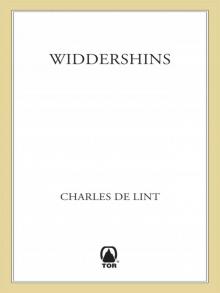 Widdershins
Widdershins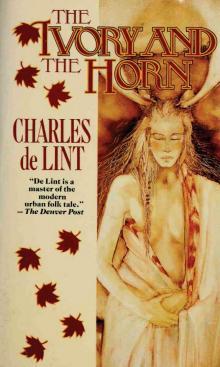 The Ivory and the Horn
The Ivory and the Horn Yarrow
Yarrow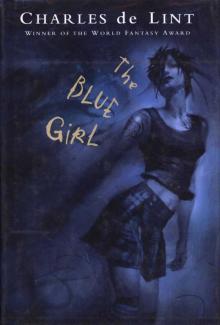 The Blue Girl
The Blue Girl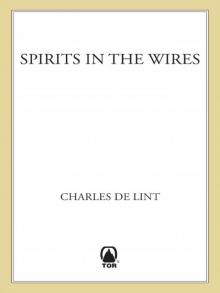 Spirits in the Wires
Spirits in the Wires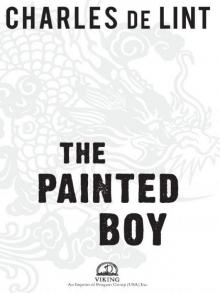 The Painted Boy
The Painted Boy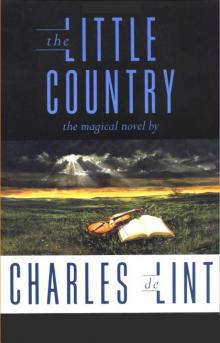 The Little Country
The Little Country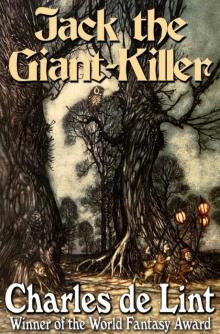 Jack of Kinrowan: Jack the Giant-Killer / Drink Down the Moon
Jack of Kinrowan: Jack the Giant-Killer / Drink Down the Moon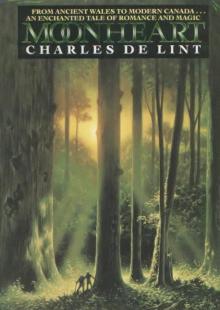 Moonheart
Moonheart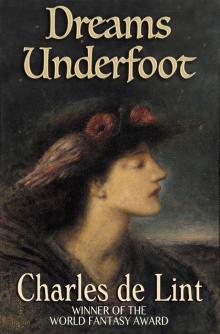 Dreams Underfoot
Dreams Underfoot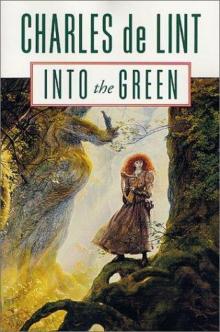 Into the Green
Into the Green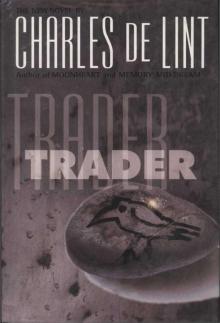 Trader
Trader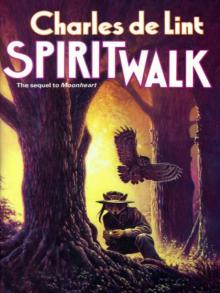 Spiritwalk
Spiritwalk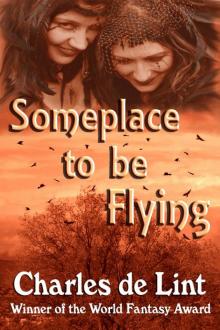 Someplace to Be Flying
Someplace to Be Flying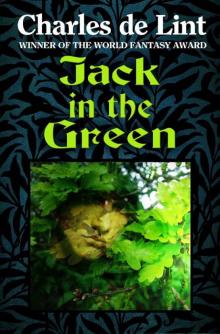 Jack in the Green
Jack in the Green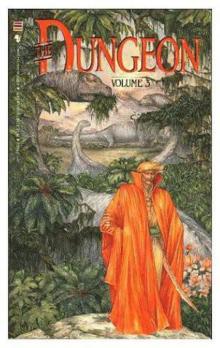 The Valley of Thunder
The Valley of Thunder Out of This World
Out of This World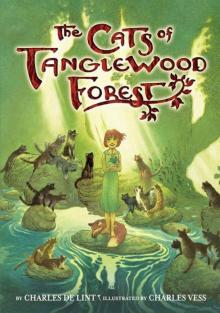 The Cats of Tanglewood Forest
The Cats of Tanglewood Forest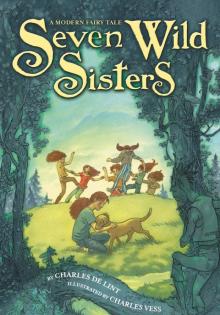 Seven Wild Sisters
Seven Wild Sisters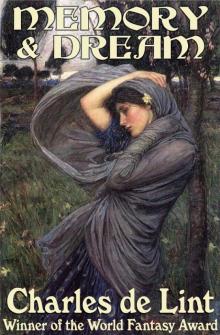 Memory and Dream
Memory and Dream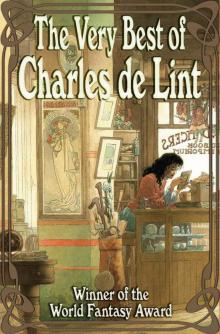 The Very Best of Charles De Lint
The Very Best of Charles De Lint Under My Skin
Under My Skin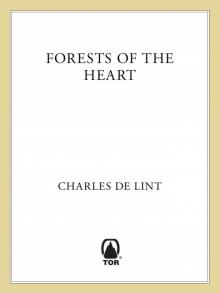 Forests of the Heart
Forests of the Heart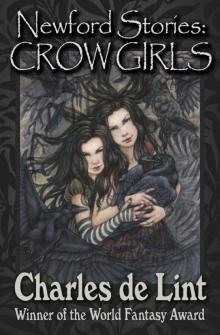 The Newford Stories
The Newford Stories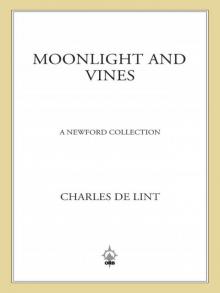 Moonlight and Vines
Moonlight and Vines Angel of Darkness
Angel of Darkness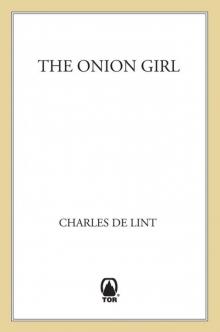 The Onion Girl
The Onion Girl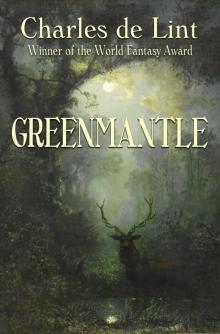 Greenmantle
Greenmantle Waifs And Strays
Waifs And Strays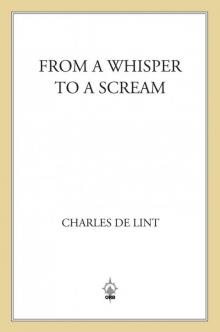 From a Whisper to a Scream
From a Whisper to a Scream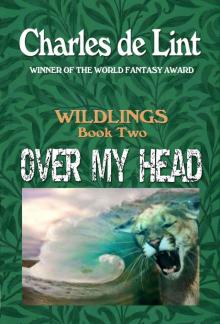 Over My Head
Over My Head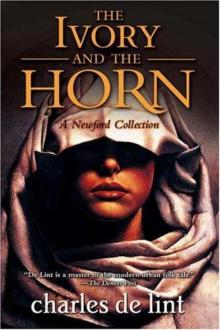 The Ivory and the Horn n-6
The Ivory and the Horn n-6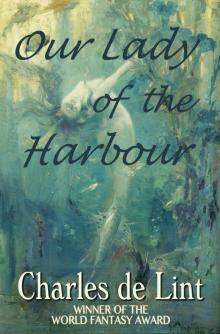 Our Lady of the Harbour
Our Lady of the Harbour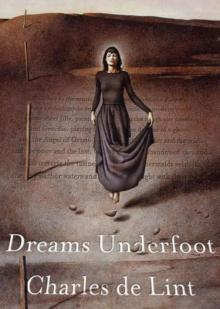 Dreams Underfoot n-1
Dreams Underfoot n-1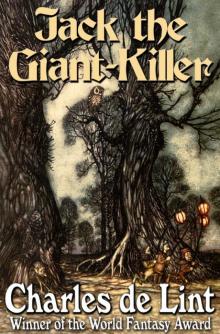 Jack the Giant-Killer (Jack of Kinrowan Book 1)
Jack the Giant-Killer (Jack of Kinrowan Book 1)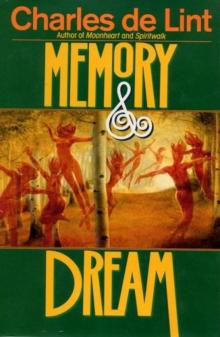 Memory and Dream n-5
Memory and Dream n-5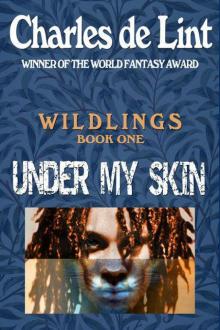 Under My Skin (Wildlings)
Under My Skin (Wildlings)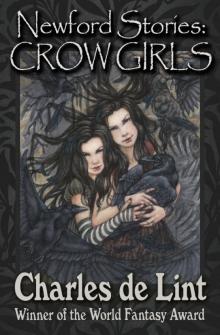 Newford Stories
Newford Stories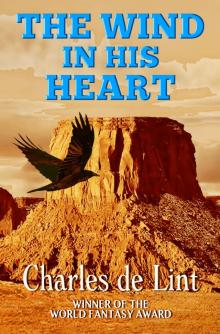 The Wind in His Heart
The Wind in His Heart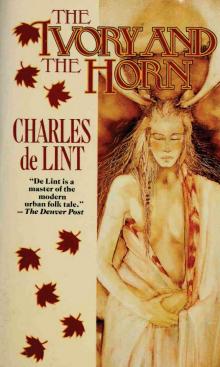 Ivory and the Horn
Ivory and the Horn